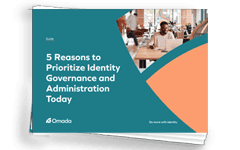Trying to connect on-premise applications to your Cloud IGA? Learn why IPSec VPNs are better than application gateways to secure connectivity.
In today’s hybrid IT landscape, seamless and secure on-premises access is crucial for your Identity Governance and Administration (IGA) solution. But with Virtual Private Networks (VPNs) and Cloud Application Gateways (CAGs) on the table, choosing the right method can feel overwhelming.
Stop the confusion! Our whitepaper provides a clear path forward, helping you understand the pros and cons of each approach and identify the best method for securing IGA SaaS connections in your environment.
Download the whitepaper and:
- Gain clarity on VPNs vs. CAGs: Understand the key differences and how they impact your IGA security
- Make an informed decision: Choose the method that best aligns with your specific needs and priorities
- Ensure seamless and secure access: Confidently connect your IGA SaaS solution to on-premises systems
Don’t wait – secure your IGA connection today!
The Challenge
Many companies have hybrid IT environments with applications both on-premises and in the cloud. When choosing an IGA solution, secure and reliable on-premises connectivity is crucial.
Why VPN is the Best Option
Omada recommends a site-to-site VPN over a Cloud Application Gateway (CAG) for several reasons:
- Superior Security: VPNs leverage the robust IPsec protocol, offering encryption, authentication, and protection against data breaches. CAGs, with their proprietary software agents, introduce potential security vulnerabilities
- Unparalleled Performance: VPNs provide low latency and high performance due to their lightweight IPsec protocol. CAGs, operating at the application level, can degrade performance
- Unmatched Compatibility: VPNs work seamlessly with various network devices and support diverse protocols and applications. CAGs may have compatibility limitations across different vendors and platforms
- Effortless Management: VPNs are easy to deploy, maintain, and monitor. They leave no footprint on your network and require no frequent updates. CAGs demand more management effort due to their software installation and maintenance needs
- Lower Cost of Ownership: VPNs offer a lower total cost compared to CAGs. CAGs incur additional costs for configuration changes, patching, upgrades, and software layers
Security Breakdown: VPN vs. CAG
- VPN: Utilizes IPsec for secure communication, protecting data from interception, modification, and replay attacks
- CAG: Relies on a proprietary software agent, potentially introducing vulnerabilities
Performance Breakdown: VPN vs. CAG
- VPN: Leverages a lightweight IPsec protocol for efficient data transmission
- CAG: Operates at the application level, potentially adding processing layers and increasing latency
Learn more about the benefits of using a VPN for secure on-prem connectivity with Omada Identity Cloud. Download our whitepaper for in-depth details.
Ready to Get Started?
Contact Omada today to discuss your IGA needs and explore how a secure VPN connection can streamline your identity management.
Why Choose Omada?
Omada Identity Cloud offers a modern, cloud-native IGA platform that empowers you to take complete control of your digital identities. Gain full lifecycle management and ensure compliance across all business applications and IT systems.






















